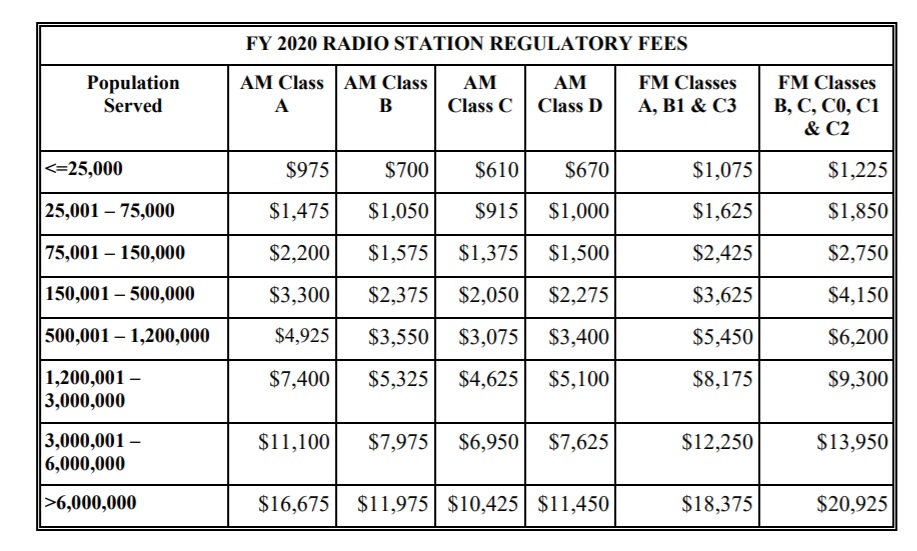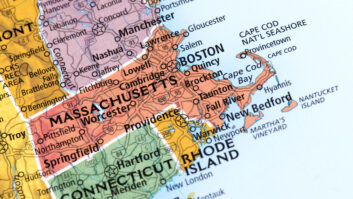Text has been updated with confirmed due date.
The Federal Communications Commission has finalized the 2020 regulatory fees for U.S. broadcasters, which are due Sept. 25. There’s little joy for radio, which will see its fees increase.
The finalized fees for radio are posted at the bottom of this story.
The National Association of Broadcasters, among others, had mounted a particularly forceful effort in its public comments this year about the need for relief.
[Read: “NAB Again Goes to the Mat Over Fee Increases”]
But the commission rejected arguments that radio regulatory fees should be frozen at prior levels (or even waived entirely). It wrote, “The radio broadcasters’ arguments … reflect an incomplete understanding of the methodology that the commission has used for years.”
The FCC said freezing fees for one group would have to come at the expense of other regulated parties. And it said an unexpected drop in the number of radio broadcasters from 2019 to 2020 means the remaining stations have to bear more of the burden.
NAB Senior Vice President of Communications Ann Marie Cumming responded with a statement saying that the association “believes strongly that the commission’s methodology for calculating regulatory fees is deeply flawed and would not survive judicial review.” She said the FCC should “convene stakeholders” to take a closer look at its whole approach to regulatory fees to “ensure they are fairly and equitably applied for all entities that utilize commission resources.”
The FCC did adjust radio’s 2020 fees down slightly from what had been proposed, citing a computational error, and NAB thanked Chairman Ajit Pai and his staff for that.
The commission did put in place some steps to help broadcasters whose businesses have been whacked by the pandemic.
We asked attorney Francisco R. Montero, partner in Fletcher, Heald & Hildreth, to break all this down for us.
Radio World: Whom were you representing in this proceeding about regulatory fees?
Francisco Montero: I was representing a consortium of state broadcast associations made up of the Colorado Broadcasters Association, the Florida Association of Broadcasters, the Puerto Rico Broadcasters Association and the Oregon Association of Broadcasters.
RW: What is your reaction to this outcome and to the FCC’s reasoning?
Montero: I was very disappointed by the FCC’s response. Our group as well as the NAB and other broadcasters made very valid arguments as to why the broadcasting community needs relief from regulatory fees during the COVID pandemic.
Broadcasters are lifting a very heavy load in serving the public and communicating invaluable public service information on multiple crises occurring across the country all at the same time. Broadcasters are concurrently suffering massive losses as a result of a collapse of advertising revenue. The federal government is providing assistance to businesses and to individuals during the pandemic, tangible financial assistance through loans and tax filing extensions.
The FCC has provided some relief from regulatory filing obligations. But when it came to regulatory fees. No such relief was offered.
RW: The commission did respond to calls for more flexibility for payors (like radio stations) in light of the pandemic. You described these as “wins” for radio stations. Can you list those and briefly explain in a few sentences what each one means for radio stations.
Montero:
- A simplified filing procedure for financial hardship waivers and requests for deferments, to make it marginally easier to request a deferral or waiver of the regulatory fees.
- Simplified process with no hurdles for installment payment plans, to enable broadcasters to request the ability to pay regulatory fees over time rather than in a lump sum;
- Reduction of the interest rate charged for installments plans and elimination of the large down payment requirement. That this would be considered a “win” is indicative of how low we’ve set the bar. But we’ll take whatever we can get;
- Elimination of administrative fees charged for late payments and for installments plans;
- A temporary lift of “red lights” to allow for filing of waiver requests. If a broadcaster owes money from previous years they are slapped with a “red light,” which freezes their ability to file applications or request other types of relief from the FCC.
RW: What happens next in regards to the mechanics of these processes, like the financial hardship waiver?
Montero: The order directs the FCC’s Office of Managing Director to put out a public notice with more details on the financial hardship waiver, as well as the installment payment option (presumably to spell out how many payments or the duration of the installment plans).
The deadline for fee payment is Sept. 25.
The final radio fees are below. Read the full order at this link.








